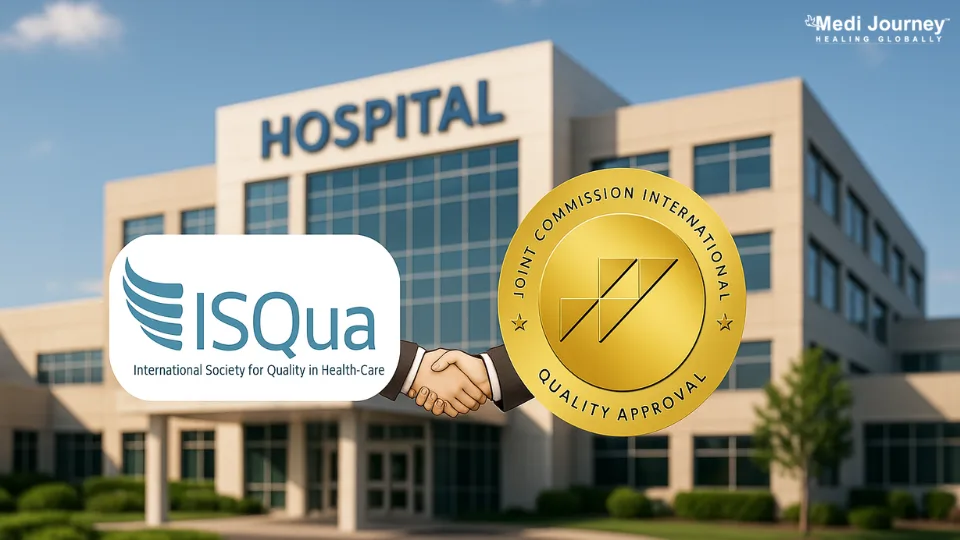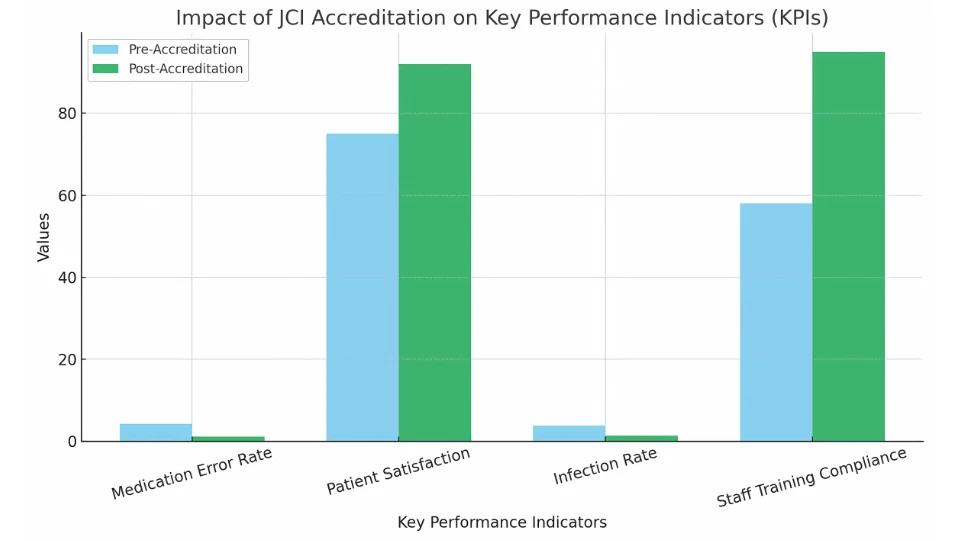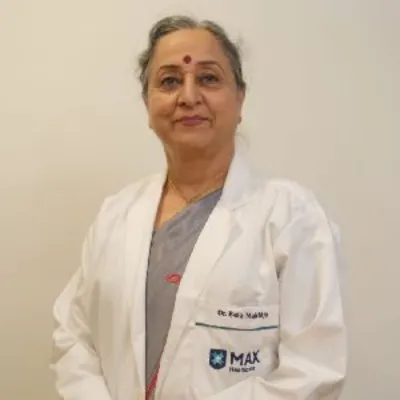Top Nephrologists in Indraprastha Apollo Hospital Delhi
 04 February,2026
Read More
04 February,2026
Read More
Enquire now in case of any assistance needed
 21 April,2025
21 April,2025

In the contemporary era, the world has become an interconnected global community, necessitating that both patients and healthcare providers have confidence in the ability of healthcare systems. The core ability is to adhere to stringent quality and safety standards. International accreditation bodies, such as the Joint Commission International (JCI) and the Global Healthcare Accreditation (GHA), among others, play a pivotal role in maintaining these benchmarks through international accreditation initiatives.
Looking at the numbers tells a compelling story. One study that analysed 27 quality performance indicators revealed something interesting: 74% of these measures improved significantly during JCI accreditation preparation. That's no small achievement.
This article helps patients as well as healthcare providers delve into the significance of these organisations and the impact on healthcare excellence. But first, we need to know what sort of responsibilities these accreditations entail and how they help maintain the standard of patient care.
Fill up the form and get assured assitance within 24 hrs!
A few prominent international organisations that set the gold standard for healthcare quality and patient safety worldwide are as follows:
Established as the international arm of The Joint Commission, it is a US-based nonprofit organisation that accredits healthcare organisations worldwide. JCI sets global benchmarks for patient safety and quality care. The accreditation is recognised as a symbol of excellence in the healthcare industry.
The organisation has accredited over Joint Commission International. Its primary goal is to improve safety and healthcare quality worldwide.
JCI's mission is to uphold and affirm the highest standards of healthcare quality and patient safety. It achieves this by developing comprehensive standards that are:
These standards cover a wide range of areas, including patient care, medication safety, infection control, and facility management.

The graph above shows the Impact of JCI Accreditation on Key Performance Indicators (KPIs). It visually compares key metrics before and after accreditation, demonstrating how JCI can significantly improve outcomes, such as reducing errors and increasing satisfaction.
Founded in 1985, ISQua operates as an independent nonprofit organisation that promotes quality improvement in healthcare worldwide. They've earned the nickname "accreditor of accreditors" because they are the ones evaluating and giving their stamp of approval to other healthcare accreditation bodies.
At its heart, ISQua aims to spark and fuel improvements in healthcare quality and safety worldwide. They're actively driving change through education, knowledge exchange, external evaluations, and bringing together healthcare professionals through global networks.
ISQua makes this happen through several key initiatives:
ISQua's standards focus on evidence-based practices and care that truly centres on the person, sustainability, fairness, and integrity.
A relative newcomer, GHA hit the scene in 2016 as an independent accrediting body with a laser focus on boosting patient experience and care excellence for medical travellers specifically. Hospitals, clinics, and healthcare organisations worldwide turn to GHA for accreditation and certification.
GHA's driving mission? Raising the bar for healthcare standards globally. They envision a world where every patient's healthcare journey stands out for its excellence and trustworthiness.
GHA's standards aim to:
Worth noting is that ISQua's External Evaluation Association has accredited GHA's standards, which confirms they are in line with international benchmarks for accreditation bodies.
Both international accreditation bodies play crucial roles in driving healthcare quality and safety globally. Their accreditation programs help healthcare providers implement best practices, build patient trust, and deliver top-notch service.
Healthcare accreditation serves as a framework for healthcare organisations to evaluate and improve their services. Here's how these organisations contribute to healthcare quality:
Patient safety is a core component of the standards of accreditation bodies. They require healthcare organisations to implement protocols. This accreditation and the standards minimise risks and prevent errors, thereby safeguarding patient well-being.
JCI accreditation ensures that healthcare providers adhere to standardised clinical practices. The uniformity leads to consistent and reliable patient care, reducing variability in treatment outcomes.
International accreditation bodies are encouraged to engage in continuous quality improvement. Regulatory bodies conduct regular assessments and audits to identify areas for improvement, fostering a culture of excellence.
Accreditation signals to patients and the public that a healthcare organisation is committed to maintaining high standards. The trust influences patient choices and enhances the organisation's reputation.
Achieving JCI accreditation is a rigorous process that spans 12 to 36 months. The steps include:
The accreditation is valid for three years, after which organisations must undergo re-evaluation to maintain their status.
While accreditation offers numerous benefits, healthcare organisations may face challenges such as
Healthcare accreditation is a time-consuming and costly process. It demands significant financial investment in infrastructure, training, documentation, and compliance monitoring.
Organisations must allocate or hire trained personnel who focus solely on accreditation activities, including quality managers, data analysts, and trainers.
Employees, including those in leadership roles, may resist changes in workflow, particularly when stricter protocols are introduced.
Implementing these changes often requires dedicated personnel and added documentation, along with a broader cultural shift toward patient safety, accountability, and continuous improvement.
Accreditation bodies expect detailed documentation of all processes. From patient admission to discharge, many hospitals initially lack formal documentation. They need to create and restructure standard operating procedures (SOPs), protocols, and checklists.
Staff at all levels must be trained to follow new procedures, such as infection control, medication safety, and emergency preparedness. The training should be continuous and well-documented, which can be challenging logistically.
A lack of digital systems for health records, quality indicators, or audit trails can hinder the accreditation process.
Investing in a hospital information system (HIS) or electronic medical records is often a necessary step.
MediJourney stands out as the premier healthcare navigation platform by connecting patients exclusively with rigorously vetted, internationally accredited hospitals that meet the highest standards of clinical excellence.
Unlike generic medical tourism services, MediJourney's comprehensive accreditation verification process ensures that every partnered facility has been thoroughly assessed by international accreditation bodies such as JCI, guaranteeing world-class infrastructure, qualified specialists, transparent safety protocols, and ethical practices.
By choosing MediJourney, you can gain access to a carefully curated network of trustworthy healthcare providers where quality is never compromised.
International accreditation bodies, such as JCI and GHA, play a crucial role in this process. It is evident from the above information that the regulatory bodies are elevating healthcare standards. The frameworks guide organisations towards delivering safe, effective, and patient-centred care.
The healthcare landscape is building trust among patients and providers to uphold the medical and healthcare standards via accreditation. The next time you look up a hospital for you and your loved ones, don't forget to check for these standards.
Fill up the form and get assured assitance within 24 hrs!
B.Sc in Media Science from NSHM Knowledge Campus, Kolkata, 2019-2022
Suryani Dutta is an experienced content writer, specializing in healthcare and medical tourism. With a B.Sc. in Media Science from NSHM Knowledge Campus, Kolkata, she creates engaging, accurate, and SEO-friendly content that empowers patients to make info
Director
Kidney Transplant Surgeon, Uro-oncologist, Urologist
Aakash Healthcare Super Speciality Hospital, Dwarka, New Delhi
Dr. Vikas Agarwal is a reputed Urologist and Kidney Transplant Surgeon with an experience of more than 22 years. His expertise lies in a wide range of laparoscopic surgeries, including laparoscopic donor nephrectomy, kidney, prostate, and bladder cancer surgery....
Senior Consultant
Medical Oncologist
Nanavati Super Specialty Hospital, Mumbai
WhatsApp UsSenior Director
Gynecologist and Obstetrician, IVF Specialist
Max Super Speciality Hospital, Shalimar Bagh, New Delhi
WhatsApp UsSenior Director
Gynecologist and Obstetrician, IVF Specialist
Max Smart Super Speciality Hospital, Saket, New Delhi
WhatsApp UsSenior Director
Gynecologist and Obstetrician
Max Smart Super Speciality Hospital, Saket, New Delhi
WhatsApp UsSenior Director
Gynecologist and Obstetrician
Max Smart Super Speciality Hospital, Saket, New Delhi
WhatsApp UsSenior Director
Gynecologist and Obstetrician
Max Smart Super Speciality Hospital, Saket, New Delhi
WhatsApp UsThe Art of Effective Communication
 04 February,2026
Read More
04 February,2026
Read More
 02 February,2026
Read More
02 February,2026
Read More
 27 January,2026
Read More
27 January,2026
Read More
 20 January,2026
Read More
20 January,2026
Read More
 16 January,2026
Read More
16 January,2026
Read More
Trusted by Patients
"I am Asim from Bangladesh and was looking for treatment in India for neuro. I visited many websites to get the complete information regarding the treatment but I was not satisfied as I was getting confused. In the meanwhile, one of my friends suggested I seek help from Medi Journey as he experienced his medical journey very smoothly and was satisfied with it. They have filtered the top 10 doctors as per experience, the success rate of surgery & profile, so it helps us to choose the best treatment in India. "
"For my knee surgery, Medi Journey guided me to BLK Hospital where I received exceptional care. The team's support and the expertise at BLK Hospital exceeded my expectations. Thank you Medi Journey for making my medical journey stress-free. "
"I came from Iraq for my granddaughter's eye surgery in India facilitated by Medi Journey, due to critical cases they advised us to get a second opinion from the different hospitals before going to surgery. Finally, we went to Fortis Escort Hospital, which helped us to get more confidence for diagnosis. Fortis Escort Hospital has the best eye surgeon team with the latest instruments. Thanks to all team members for providing a high-quality treatment in India at an affordable cost. "
"I came for my hair transplant in India, before coming I was so confused about choosing the best clinic and surgeon for me. But thanks to God one of my friends had a hair transplant in India through Medi Journey. He recommended me to go with them. I am completely happy with my experience with them. They were always very fast in their responses to me. the success rate of my hair transplant surgery is 100%."
"Artemis Hospital, suggested by Medi Journey, turned out to be a great choice for my treatment. The personalized assistance and medical care were exceptional. I'm grateful to Medi Journey for guiding me to a hospital that perfectly matched my needs. Highly recommended! "
"I came from Afghanistan for my treatment in India at Jaypee Hospital, Noida. I had a fantastic experience with Medi Journey. Kudos to them for their incredible support during my medical journey. They not only took care of all the logistics but also connected me with a fantastic healthcare team. Efficient, caring, and highly recommended for a hassle-free medical tourism experience."
"I am Adam from Kano, Nigeria, one of my friends from Nigeria was facilitated by Medi Journey, and he recommended us to go with them. I sent my all reports to them and within 48 hours they reverted with 4 options from different hospitals. They helped me to get a Visa letter from the hospital, arrange pick-up from the airport, and book a hotel for me. Their team is very honest and throughout our stay in India they are with us they are caring for us like his family members. BLK Hospital is the best hospital in India with a top surgical oncologist surgeon team, a very advanced OT, and a Radiotherapy department. I wish more success to Medi Journey. "
"Great experience at the Max Hospital for my spine surgery and was successfully done. I thank my neurosurgeon and his entire team. I recommended all of my country's people to Medi Journey for treatment in India, they choose the best hospital, the best doctors, and the best cost for patients."
"I came to India from Dhaka, Bangladesh for my father-in-law's cardiac surgery at Fortis Hospital. I was confused about choosing the best surgeon for him before coming, but their team helped me to choose the best hospital and best cardiac surgeon in India with very good cost and 100% success rate of surgery. I am very happy with the services, really they make my journey so comfortable that make me feel at home. Thanks again and I like people to choose "Medi Journey" as your travel guide. "
"I am Mohammad from Bangladesh came to India for my general health checkup. Medi Journey offers me the complete package including Pick-up from the airport, hotel services, and 24-hour assistance. They guide you to choose the best hospital in India, the best cost of treatment with top-most doctors and give you complete information about hotel booking, and pick-up from the airport before coming to India They have the best team to help. Always choose Medi Journey for your treatment in India."





